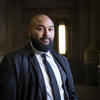Proactive Prosecutor
Long before he was hired by the Philadelphia district attorney’s office, Amando E. Dominick, LAW ’21, eyed the progressive office from a distance and even applied to law school in Philadelphia because he could envision himself working there.
Now part of the Major Trials unit, he handles felony jury trials, felony waiver trials and appears in court on a daily basis. He prioritizes negotiating fair sentences for convicted people—which he says is much harder than going with the status quo, but delivers a better outcome for the individual.
“We can’t just prosecute and enforce our way out of issues,” he said. “We have to be proactive and invest in communities.”



